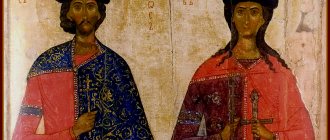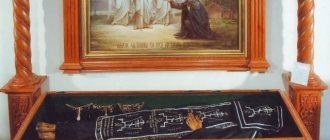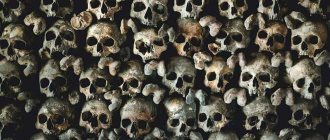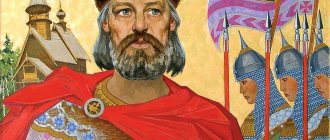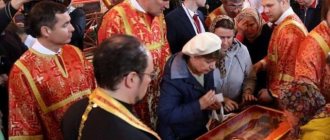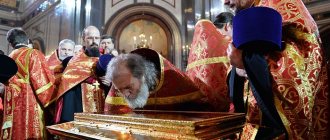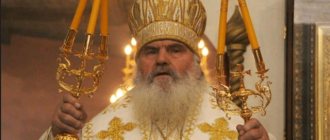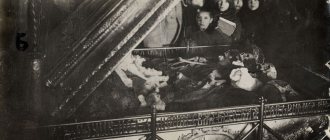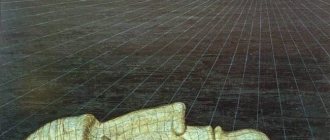Gleb Vladimirovich Muromsky belongs to the first Russian martyrs - passion-bearers, together with his brother Boris.
Both princes are the first saints in Rus'. Gleb, like the other sons of Vladimir the Baptist, is from the 5th tribe of Rurik, the youngest son.
Born before the Baptism of Rus' and raised as a Christian. The young man accomplished a religious and spiritual feat, showing meekness and non-resistance to cruelty for the sake of brotherly love and loyalty.
The Orthodox Church celebrates the Day of Remembrance of Saint Gleb on September 18.
↑ Biography
The future Saint Gleb was born between 984-987. Mother is the legal wife of Prince Vladimir the Red Sun, the Bulgarian princess Milolika. Some scholars call the Byzantine princess Anna.
From his father, around 1010-13, the young prince took possession of the Murom lands and began to be called the Prince of Murom. But it was not possible to get into the city. The residents of Murom, malicious pagans, refused to accept Christianity and did not open the gates to Gleb.
Not wanting to start a war, the prince climbed 12 miles along the Ishna River, where he settled in the princely court. Over time, he allocated a place for the first temple in the name of the All-Merciful Savior. Later, a monastic Christian monastery appeared, which became the Spaso-Preobrazhensky Monastery.
Gleb Vladimirovich constantly took care of the spread of the Christian faith, treated the poor - the crippled, and supported them with alms. The reign, unfortunately, did not last long. In 1015, Gleb was killed by his half-brother in the same way as Boris.
↑ Murder
Saint Vladimir loved the younger Boris and Gleb very much and singled them out from other children. The adopted son Svyatopolk did not like this. When his father died in 1015, he arbitrarily sat on the throne in Kyiv, and killed Boris. Having committed the murder, the villain called Gleb to Kyiv, fearing revenge on his part.
The young prince, to whom brother Yaroslav conveyed the terrible news with advice not to go to the capital, set off on his journey. Knowing that the same fate awaited him as Boris, he abandoned the war against his brother, wishing to accept torment like Christ.
During a tearful prayer for his father and Boris, while on the Smyadyn River near Smolensk, the prince was attacked by Svyatopolk’s people. The killers planned that the young man would be killed by his own servants. And so it happened: the crime was committed by cook Torchin. The lifeless body was laid on the shore between two logs, covered with branches.
After 4 years, brother Yaroslav found the body, which was transferred with all triumph to the Vyshgorod Church of St. Basil. Gleb was interred in the same place with his brother Boris. Another 7 years later, Prince Yaroslav built a church here, called Borisoglebskaya. And Yaropolk was overtaken by God's punishment. The people of Kiev expelled the impostor and fratricide. Wandering without shelter, he disappeared without leaving a trace.
Father's death
Saint Prince Vladimir had three sons who were killed by his brother Svyatopolk: Svyatoslav, Boris and Gleb.
Only Boris and Gleb were canonized (baptized David and Roman, +1015). There was never any talk about glorifying Svyatoslav. Svyatopolk, who began to kill his brothers in order to sit on the grand-ducal throne, only imitated his father Vladimir when he was still a pagan - Saint Boris himself recalls this (in the words of the chronicler of all Rus' Nestor). But later, Vladimir freely accepted the Christian faith, was baptized and changed so much that he could no longer give orders for the death penalty, for which the Greek fathers even reproached him. This new Vladimir gave birth to his youngest sons - Boris and Gleb.
It is known about Boris that he received an excellent education, was excellent with a sword and horse, was brave, smart, and well-read in the Holy Scriptures. Especially, as Nestor writes, he loved the lives of saints. Managed to get married. Gleb was raised together with his brother and loved him very much.
During his father’s life, Boris occupied the princely table in Rostov, and Gleb in Murom. Vladimir unconditionally trusted Boris, shortly before his death he kept him with him in Kyiv, giving various military assignments. Returning from one such campaign, Boris received news of the death of his father and the new prince of Kiev, his elder brother Svyatopolk, who had accepted the throne.
Despite the legitimacy of Svyatopolk's power, some of Vladimir's sons decided to challenge the throne - this is where internecine times, discord and betrayal at the state level begin in Rus'. The princes found reasons for their brother’s unworthiness and laid claim to the throne. Neither kinship, nor oaths, nor common faith bothered him, nor did he stop the murder. Who remembers “Andrei Rublev” and “the Ryazan s……ch” - the Russian princes later did not disdain to take Mongols as comrades in order to beat each other, and yet almost everyone was related to each other.
Vladimir’s son Yaroslav, later nicknamed the Wise, also got ready to fight for the throne. It is not known how the matter would have ended, but Svyatopolk was ahead of his brother and began to eliminate possible rivals.
Such was the state of souls and minds in the ancient Russian state: there were still three centuries left before “strength in truth”, monasteries with an evangelical way of life were barely beginning, there were no spiritual fathers for the people for metanoia to take place. And there were no catechesis courses, as in the ancient Apostolic Church. A person’s life was worth almost nothing; he killed, especially if you were a prince, and passed by, took revenge on the offender, tooth for tooth, and saved face. But.
There were already swan churches - a favorite folk image, the bells were ringing, gathering the boyars and smerds to pray, uniting them against the general danger, they prayed to icons with images of the Savior and the Virgin of God, and there weren’t really any saints then, except maybe a couple of Greek ones.
↑ Canonization
Gleb and Boris were canonized as passion-bearers, they were given the ranks of saints who fulfilled the laws of God and died a violent death. At the same time, the brothers did not hold a grudge and did not resist. The exact date of canonization has not been established and there is debate among scientists and historians.
Some claim that this is 1019-20, others point to 1039. But be that as it may, since 1071 both brothers have been canonized as the first Russian saints. These are martyrs, beloved and revered by Christians of Rus' - saints. These saints are commemorated in church three times a year:
- May 15th - transfer of relics to a new temple built by nephew Izyaslav.
- August 6th - both Boris and Gleb are celebrated.
- September 18th - St. Gleb's Day.
Memory and veneration
Canonized together with his brother Boris by the Russian Orthodox Church as passion-bearers - Saints Boris and Gleb. Settlements were named in honor of the holy brothers, and many churches and monasteries arose in different cities of Russia - until the middle of the 16th century, the chronicler cites more than 20 cases of churches being built in their honor. He was buried with his brother in Vyshgorod. Gleb, under the name David of Poland, is included in the list of saints of the Roman Catholic Church.
Truly you are princes to princes and princes to princes, for with your help and protection our princes defeat all opponents and are proud of your help. You are our weapon, the Russian land’s protection and support, double-edged swords, with them we overthrow the insolence of the filthy and trample the devil’s machinations on earth. — The Tale of Boris and Gleb
Martyrs-passion-bearers: noble princes Boris and Gleb, icon of the 14th century.
The Legend of Boris and Gleb
A monument of ancient Russian literature, dedicated to the history of the murder of the sons of Prince Vladimir the Baptist, Boris and Gleb, who were later canonized as passion-bearers. The legend was written in the middle of the 11th century in the last years of the reign of Yaroslav the Wise. Later, the Legend was supplemented by a description of the miracles of saints (“The Tale of Miracles”), created in 1089-1115 by three authors successively. In this form, the text is contained in the oldest known list as part of the Assumption Collection of the late XII - early XIII centuries.
In total, “The Tale of Boris and Gleb” has been preserved in more than 170 copies. The author of the Legend, based on the research of Metropolitan Macarius and M.P. Pogodin, is considered to be Iakov Chernorizets.[3]wikipedia (Image description) 1. Boris and Gleb are awarded martyr’s crowns by Jesus Christ 2. Boris goes against the Pechenegs
“The Tale of Boris and Gleb” (facial miniatures from Sylvester’s collection of the 14th century) Read the original text and translation of “The Tale”
Reading about Boris and Gleb
A monument of ancient Russian literature, written by the Venerable Nestor the Chronicler. “Reading” is dedicated to the story of the murder of princes Boris and Gleb and, according to a number of researchers, was written earlier than “The Tale of Boris and Gleb”, created, according to their version, after 1115 on the basis of “Reading” and chronicle material. “Reading” is written in the hagiographic genre, the author describes unknown facts from the chronicles from Boris’s youth (the dream of martyrdom under the influence of reading the lives of saints, avoidance of marriage and marriage only at the insistence of his father: “not for the sake of bodily lust,” but “for the sake of the law” for the sake of the king and the obedience of his father."[4]wikipedia
“Nestor the Chronicler” - V. M. Vasnetsov. 1885 - 1893
Family of Vladimir I
Children of Vladimir I
Section "Vladimir I"
↑ Example from life
The chronicle describes a case of healing of a lame boy. In Vyshgorod, Saints Boris and Gleb came to a sick young man in a dream. They crossed the sore leg, and in the morning, when he woke up, the teenager stood up and no longer limped. Yaroslav the Wise learned the news of the miraculous recovery and, by his order, a church with five domes was founded in this place. The temple was consecrated in 1026, on the day when Boris was killed - July 24th.
The patron saints of the Russian lands, Boris and Gleb, protect from enemy raids. Records have been preserved of how the holy brothers blessed Alexander Nevsky for the Battle of the Ice, and Dmitry Donskoy before the Battle of Kulikovo.
A strong fire that occurred in the temple with the relics of the passion-bearers destroyed everything that was there, but did not touch the holy relics.
Boris and Gleb. Springs of Holy Rus'
On May 15, the Orthodox world remembers the Translation of the relics of the holy passion-bearers, the Russian princes Boris and Gleb, at the Holy Baptism of Roman and David, performed in 1072 and 1115.
It is easy to see - the history of Rus', starting from baptism, was subsequently revealed more than once to contemporaries as if created in the image of sacred biblical history, as a result of which an understanding arose of its side as Holy Rus'. But the obvious had to be seen, what was seen had to be understood. The ancestors saw and understood. Since the 11th century, our literature, correlating biblical events with the events of Russian history, has set a special height for comprehending the meaning of Rus', man and God's world.
The first Russian saints - the passion-bearing princes Boris and Gleb, the sons of the Baptist Vladimir the Red Sun, bore the obvious image of the God-loving Abel. In the person of their murderer, in their elder brother Prince Svyatopolk, our ancestors immediately recognized the image of Cain. Boris was killed near Pereyaslavl Russky (now Pereyaslav-Khmelnitsky) on the Alta River on August 6 (July 24, old style) 1015. Gleb - six weeks later - September 18 (5) not far from Smolensk, on the Smyadyn River (now within the boundaries of Smolensk).
Svyatopolk went down in history with the nickname Damned. The mark of Cain on him was seen not only in the fact that he killed his brothers, and not only in the fact that his brothers were lovers of God. But also in the fact that his fate, after the crime committed, was fulfilled exactly according to the words of the Lord addressed to Cain: “You will be an exile and a wanderer on earth.” Svyatopolk, having been defeated by Yaroslav, in madness, possessed by a demon, fled to foreign borders, pestering the servants, repeating with painful anxiety: “Is anyone chasing us?.. They are already chasing, oh, they are chasing, run!” The Monk Nestor the Chronicler tells us about his death: “He could not bear it in one place, and he ran through the Polish land, driven by God’s wrath, and ran to a deserted place between Poland and the Czech Republic, and there he miserably ended his life.” A special word was also said about his grave: “There is his grave in that deserted place to this day. A terrible stench emanates from it.” Actually, this is a gap to hell.
According to pagan custom, Grand Duke Vladimir had several wives and many concubines at the same time before his baptism. There were a lot of children. The chronicler names 12 sons, whom Vladimir baptized in his time. Vladimir himself was baptized by Vasily. Svyatopolk received the name Peter, Boris - Roman, Gleb - David, Yaroslav - George... The younger Boris and Gleb were brought up in the Christian spirit.
Yaroslav, who had a serious conflict with his father, reigned in Novgorod. Svyatopolk - in Turov. Boris is in Rostov. Gleb is in Murom. After the death of Vladimir, the Kiev throne was seized by Svyatopolk, who “suddenly” found himself with his father. The chronicler reports: “When Vladimir fell ill, Boris was with him at that time. Meanwhile, the Pechenegs went on a campaign against Rus', Vladimir sent Boris against them, and he himself became very ill; of this illness and died on the fifteenth day of July" (1015). It seems that the Pecheneg campaign did not actually take place, and Boris was simply removed from Kyiv by intrigue. Nestor continues: “When Boris had already returned with his army, not finding the Pechenegs, the news came to him: “Your father has died.” And he cried bitterly for his father, because he was loved by his father more than anyone else...” Further, Nestor writes: “Svyatopolk sat down in Kyiv after the death of his father, and called the people of Kiev, and began to give them gifts. They took it, but their hearts did not lie towards him, because their brothers were with Boris...” A moment of uncertainty arose for his subjects. Prince Vladimir's squad was on a campaign with Boris, in whom his father, apparently, saw a successor. The army was on Boris's side...
We see a portrait of Boris in the anonymous essay “The Tale of the Passion and Praise about the Murder of the Holy Martyrs Boris and Gleb”: “... tall, broad in the shoulders, thin in the waist, his face was round, cheerful, kind eyes, beard and mustache small, for he was still young. He shone royally, adorned like a flower with his blooming youth. He was brave in battle, wise and sensible in council, the grace of God bloomed in him.”
But the army, as at all times, needs certainty. Boris did not rush to Kyiv, he settled on Alta. The last word remained with him. The chronicler continues: “The father’s squad told him: “Here you have your father’s squad and army. Go and sit in Kyiv on your father’s table.” He answered: “I will not raise my hand against my elder brother: if my father died, then let this one be my father instead.” Hearing this, the soldiers dispersed from him...” In pagan times, it would have been commonplace to forget about brotherhood and take for yourself what comes into your hands. But for someone raised in Christianity, this was already unthinkable. To act according to your conscience means to refuse even that which arouses envy in someone. The army left for Kyiv. His small squad, the “youths,” remained with Boris. This undoubtedly strengthened Svyatopolk, who “full of lawlessness, accepted the thought of Cain.” He sent assassins to Alta.
Boris learns about the arrival of the murderers while serving Matins in his tent. He sang psalms. The killers heard it rushing over the river: “For dogs surrounded me, a crowd of evil ones surrounded me...”
The very first Russian writers show that man, created in the image of God, can imitate His Son, sent to save the world, in everything. Nestor cites Boris’s prayer words spoken before the holy icon: “Lord Jesus Christ! Just as You appeared on earth in this image for the sake of our salvation, by Your own will allowing Your hands to be nailed to the Cross, and accepting suffering for our sins, so grant me the ability to accept suffering. I do not accept this suffering from my enemies, but from my own brother, and do not hold it against him, Lord, it is a sin.” We not only know the names of the murderers, but we also know their characteristics given by the ancient writer: “Here are the names of these criminals: Putsha, Talets, Elovit, Lyashko, and their father is Satan.” Why Satan, if we know that they are the Vyshgorod boyars? And here’s why, Nestor explains for centuries: “For such servants are like demons: demons are sent for evil, but angels are sent for good deeds.” What is no less important, we also know the name of Boris’s faithful servant, who protected his prince from the spears hitting him - George, a Hungarian by birth.
Boris's body was secretly taken by the killers to Vyshgorod (a significant and wealthy city in which one of the grand ducal residences was located) and buried in the Church of St. Basil, which was once built by Grand Duke Vladimir in honor of his heavenly patron. Having killed Boris, Svyatopolk began to think about eliminating other potential rivals.
“The accursed Svyatopolk began to think: “I killed Boris; how to kill Gleb? And, having conceived Cain’s affair, he deceivingly sent a messenger to Gleb, saying: “Come here as soon as possible, your father is calling you: he is very ill.” To accomplish his plan, he needed to lure his brother out of Murom. And it was a success. Gleb traveled a considerable part of the way. The killers were waiting for him at Smyadyn... In those days, the Smyadyn River, which flows into the Dnieper, was navigable and had a convenient bay for ships.
There he received a belated warning from Yaroslav: “Don’t go: your father died, and your brother was killed by Svyatopolk.” Gleb prayed: “Woe is me, Lord!” And he turned his thoughts to his brother: “If your prayers reach God, then pray for me, so that I too may accept the same martyr’s death. It would be better for me to die with you than to live in this world full of lies.” Gleb’s small squad, seeing the killers, lost heart. The leader, nicknamed Goryaser, mockingly ordered the cook who was with Gleb to kill the prince. He, “in the name of Torchin, took out a knife and slaughtered Gleb like an innocent lamb.”
We see how the earthly world and the heavenly world united over Russia: Gleb “received the crown of the kingdom of God, entering the heavenly abodes, and saw his longed-for brother there, and rejoiced with him with the indescribable joy that they were awarded for their brotherly love...”.
Nestor wrote “Reading about the life and destruction of the blessed passion-bearers Boris and Gleb” (1081-1088), when the relics of the passion-bearing princes had long since become famous for miracles, and the princes themselves were canonized by the Church both in Rus' and in Constantinople.
Nestor is not just a chronicler, but also a brilliant publicist. He speaks scathingly about the murderers - as a lesson to his contemporaries and descendants: “The damned returned back, as David said: “Let sinners return to hell.” When they arrived, they said to Svyatopolk: “They did what you ordered.” Hearing this, he became even more proud, not knowing that David said: “Why do you boast about your wickedness, O mighty one?”
And a war began, which in 1019 ended with the flight of Svyatopolk and the establishment of Yaroslav on the grand-ducal throne, called the Wise by posterity.
Grand Duke Yaroslav ordered that the body of his brother Gleb be found and transferred to Vyshgorod, buried next to Boris. The Ancient Life tells: “It is wonderful and wonderful and worthy of memory that the body of the saint remained unharmed for so many years, untouched by carnivorous animals, and not only did not turn black, as happens with corpses, but was light, beautiful, whole and fragrant. Thus God preserved the remains of his sufferer.” The chronicles say that Gleb’s body was thrown “between two decks.” Apparently, these decks were used as a coffin. There can be no doubt that for several years the saint’s body remained incorrupt and fragrant: every believer knows such relics. The first Life of Boris and Gleb was compiled in 1035-1036, under Yaroslav the Wise, when the relics were raised and found incorrupt and fragrant. They soon became famous for their miracles. And the wondrous holiness of those miracles was undoubted not only to those healed and not only to those to whom the holy princes appeared through prayer and provided help, but to all believers in Christ. For a people who had recently emerged from destructive paganism, this was a gift from God, a confirmation of the truth of their chosen path. The miracles were obvious (visible to the eyes), just as they were obvious in ancient times, revealed by Christ and His Apostles. In 1072, the relics of the saints were transferred to a new stone church, erected in honor of Boris and Gleb. Under Vladimir Monomakh, the grandson of Yaroslav the Wise, the silver boards of the coffins were gilded. Moreover, Vladimir did this in secret (in 1102, before he had yet taken the grand-ducal throne), not for show: “Having arrived at night, he measured the coffins and, having forged the silver boards, gilded them.” And in 1115, when Vladimir, who loved and revered the saints, transferred the relics to a new stone church, and having arranged an extraordinary celebration, he placed them in the “silver tower”. Eyewitnesses of the miracles performed through the prayers of Boris and Gleb were both ordinary people, whose names are only known thanks to the Lives of the Saints, and historical figures, such as the noble Grand Dukes - Alexander Nevsky and Dmitry Donskoy...
There were at least three cities in Rus' with the name Borisoglebsk. It’s unlikely that anyone would attempt to count the number of churches and monasteries consecrated to the glory of the holy noble princes Boris and Gleb. The places where the holy princes were were considered sacred from ancient times. The first chapel on the blood in honor of Boris and Gleb existed even before 1073 and was called the Alta Goddess. In 1664, a stone cross was erected on that site. During the godless years they tried to pull him out with a tractor. It ended convincingly: the cable broke, killed someone, and the tractor caught fire. In modern times, the cross has become famous for its miracles, one of which we will talk about later.
The Boris and Gleb Monastery in Smyadyn was founded in the first half of the 12th century, where the holy noble prince of Smolensk Rostislav Mstislavich founded a stone cathedral. It is remarkable that in honor of Boris and Gleb, Prince Rostislav baptized his sons. The youngest of them, David Rostislavich, in 1191 transported the “decrepit coffins” of Boris and Gleb to Smyadyn from Vyshgorod, in which the holy relics once rested.
Since then, the monastery on Smyadyn began to be called the “second Vyshgorod”. This place is located in the area of what is now Krasnoflotskaya Street in Smolensk. The Smyadyn River itself has long disappeared, becoming a victim of an environmental disaster that occurred as a result of reckless deforestation. Until 1917, the place was marked by a well with healing water. In ungodly times, the well was desecrated and filled with garbage. In 1991, 800 years after the removal of the dilapidated coffins and the transformation of the monastery into a large cultural center, at the site of Gleb’s death, under the care of the Foundation of Slavic Literature, a memorial sign was installed - a stone with a carved cross and the corresponding text.
The attempt to restore the well was not fully successful. The water has lost its healing properties, as believers are convinced, due to our sins; moreover, it turned out to be completely unfit for drinking. On Alta, the current church near Pereyaslav was built in 1841. The miraculous cross is located in its left aisle. This stone cross, installed back in Cossack times, recently suddenly began to stream myrrh. It is known that there were no Maslenitsa discharges on the cross either in 1981, when the temple, after many years of neglect, was turned into a museum of the Ukrainian towel, or after 1992, when the temple was transferred to the schismatic “church”. The rector of the temple, Fr. Anatoly and other priests who have known the Boris and Gleb Church for many years say (without commenting on this fact in any way) that the cross became myrrh-streamed after canonical services began in the temple. Here they say: “When the cross began to stream myrrh, no one understood anything; they thought someone had stained it with oil. At first, the pinkish spot was the size of an egg. Due to a misunderstanding, they even tried to draw it out with an iron through the paper...” In its outline, it invariably resembles the number “1”. Every year the spot increases. Its height is already about a meter...
Miracles through the prayers of Saints Boris and Gleb still occur today. Holy noble princes, passion-bearers Boris and Gleb, pray to God for us and for the revival of Holy Rus'!
2011
↑ It's interesting to know
Chroniclers describe that Gleb, before going to Svyatopolk, visited Rostov-on-Don to visit Boris. But at that time the brother, with the retinue of Prince Vladimir, went on a campaign against the Pechenegs and, most likely, was already killed by his half-brother’s people. Afterwards, the young prince came to Veliky Novgorod to see Yaroslav, with an offer to go to his sick father. The brother refused and dissuaded the younger one, who did not listen to the advice.
While riding a horse, Gleb injured his leg when the horse stumbled. But the young man ignored this harbinger of trouble. Next, Gleb goes by boat to Smolensk and on the way, not reaching 5 versts to the city, he is killed. The young prince was placed in a simple, roughly made coffin and left on the shore between the trees.
Years later, a terrible discovery was accidentally discovered by local men. The body of the murdered man lay in a crumbling coffin, untouched by decay. Refusing to fight with his brother, endlessly loving Christ, imitating his torment, Gleb humbly chose death.
↑ Results
Gleb Vladimirovich, raised in the Christian faith from childhood, loved and revered his father, carried out his will:
- By order of the young prince, churches were built in Murom.
- Gleb Vladimirovich founded a monastery not far from Murom, which existed for 6 centuries before its liquidation by Catherine the Great. The village of Borisogleb is located at this place.
- Prince Gleb is the first disseminator of the Christian faith in the lands of Murom.
- Muromo - Ryazan region from ancient times to this day remembers Saint Gleb as the first preacher of Christianity and patron of the country.
- The death of the brothers, Boris and Gleb, their humility, is perceived as a civil and religious ascetic feat. The young princes did not transgress the laws of humanity and God.
The beginning of the internecine war
After the death of Prince Vladimir the Baptist, Prince Svyatopolk, with the support of his supporters, seized power in Kyiv. According to the established historical tradition, it was Svyatopolk, wanting to protect himself from claims to the Kiev throne from other heirs of Vladimir, who sent the killers to his brother princes Boris and Gleb. Having learned about the death of Boris and Gleb, Svyatoslav Drevlyansky left his capital and tried to flee to the Carpathians, but was overtaken by the troops of Svyatopolk sent after him and died in battle.
The scheme is the second strife in Rus' Read more
Boris Vladimirovich (fragment of an icon) More details
Svyatopolk “The Damned” (Art. V. Sheremetyev. 1867) More details
